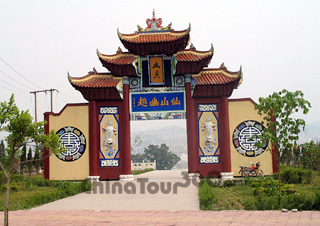 Fengdu Ghost City
Fengdu Ghost City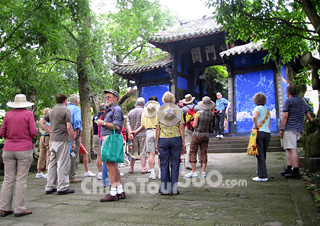 The Gate of Hell, Fengdu
The Gate of Hell, Fengdu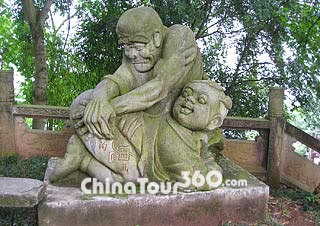 A Statue in Fengdu Ghost City
A Statue in Fengdu Ghost City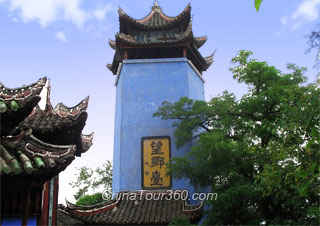 Platform for Watching Home
Platform for Watching Home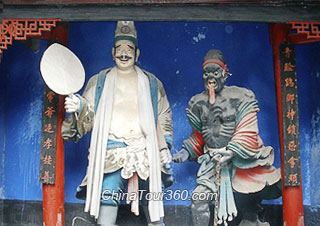 Statues, Fengdu Ghost City
Statues, Fengdu Ghost City
Located on the northern bank of Yangtze River in Fengdu County, Chongqing, Fengdu Ghost City is one of the hottest attractions of a Yangtze River Cruise tour. Consisting of three parts - Mingshan Mountain Scenic Area, Ghost Palace, and Shuanggui Mountain Forest Park - the Ghost City is famous for its ancient sites, buildings, statues, and sculptures of ghosts and the netherworld.
![]() Mingshan Mountain Scenic Area
Mingshan Mountain Scenic Area
Mingshan Mountain, also named Pingdu Mountain or Fengdu Mountain, is the most famous attraction in Fengdu Ghost City. It is said that during the Han Dynasty (206 BC - 220), two Taoists, whoes names were Yin Changsheng and Wang Fangping, became celestial beings on Mingshan Mountain, so the mountain was considered a holy mountain in Taoism. Later in the Tang Dynasty (618 - 907), the surnames - which in Chinese appear as the first names - of the two Taoists were put together to form "Yin Wang", meaning "the ruler of hell". Thus people began to believe that Mingshan Mountain was the place where the ruler of hell lived. More buildings and statues reprerenting the netherworld were constructed during following dynasties, such as Hengha Temple, Abyss Bridge (Nai He Qiao), Gate of Hell, Road to Hell (Huang Quan Lu), and Platform for Watching Hometown (Wang Xiang Tai). In addition, there are also many stone tablets with famous inscriptions in the mountain.
![]() Hengha Temple
Hengha Temple
Hengha Temple was built to commemorate the generals Zheng Lun and Chen Qi, who were both valiant generals of the Shang Dynasty (17th - 11th Century BC). After the Shang Dynasty was defeated, Zheng Lun and Chen Qi were made divine Generals Heng and Ha, and were responsible for guarding the gate of Buddhist temple, proclaiming the doctrine of Buddha, and protecting the talismans.
![]() Abyss Bridge (Nai He Qiao)
Abyss Bridge (Nai He Qiao)
Located on Mingshan Mountain, Abyss Bridge was constructed between 1403 and 1424 in the Ming Dynasty (1368 - 1644). Abyss Bridge is believed to be a bridge connecting present and past, as well as the netherworld and human world. It is also a bridge judging between good and evil, and declaring the sentence of life or death. According to Chinese legend, Abyss Bridge, built on the Blood Pond, was the first crossing a soul had to face after death. A good soul could cross the bridge easily, but an evil soul would be pushed into the Blood Pond and bitten by serpents and worms. It is said that there was a rich but immoral man in the late Ming Dynasty who often robbed other's properties. One day, he came to Mingshan Mountain to pray to Buddha. When he crossed Abyss Bridge, he felled into the Blood Pond and drowned. It might be a coincidence or only a story, but it warns us that we will pay for what we have done!
![]() Platform for Watching Hometown (Wang Xiang Tai)
Platform for Watching Hometown (Wang Xiang Tai)
In Chinese legend, after crossing Abyss Bridge, a soul will stand on a platform to have the last glimpse of his or her hometown and say goodbye to relatives, thus it is named the Platform for Watching Hometown. It was constructed in 1985, and standing here, visitors will have a full view of the Fengdu County and see the misty Yangtze River.
![]() Ghost Palace
Ghost Palace
Extending over an area of 3,000 square meters (3,588 square yards), the Ghost Palace displays both traditional architectural styles and modern techniques to present the mysterious netherworld to visitors. You will see ancient buildings and all kinds of ghosts, as well as experience the thrilling atmosphere of the netherworld.
![]() Shuanggui Mountain Forest Park
Shuanggui Mountain Forest Park
Located at the riverside of Yangtze River, Shuanggui Mountain is 401 meters (1,315 feet) above sea level. Richly verdant with an abundance of green trees, the mountain is famous for its beautiful scenery and ancient buildings, including Bell and Drum Towers, Fengdu Confucius Temple, the Great Hall of Achievements, and Avalokitesvara Pavilion.
![]() Tickets for Fengdu Ghost City
Tickets for Fengdu Ghost City
Entrance Fee: CNY 80 per person
Cableway: CNY 20 (round-trip) per person
![]() More Fengdu Attraction: Snow Jade Cave
More Fengdu Attraction: Snow Jade Cave








